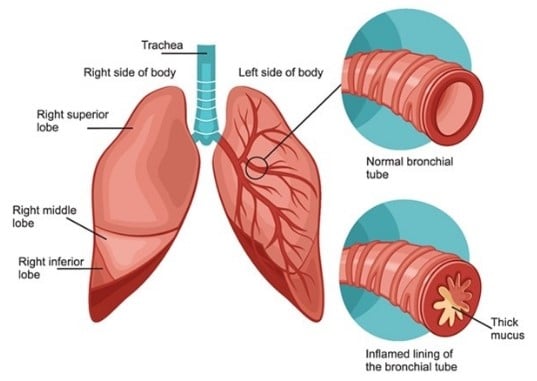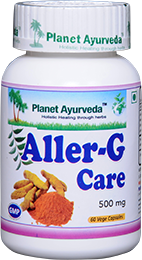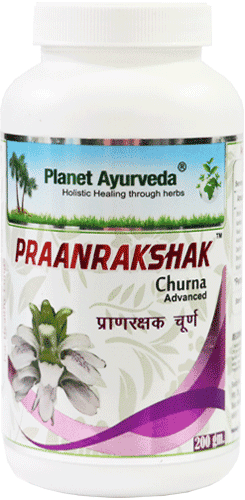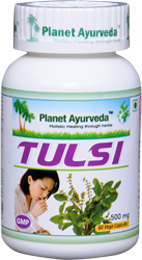Ayurvedic Treatment for Allergic Bronchitis

Allergic Bronchitis
Whenever you breathe, air enters the nose and mouth. It flows down your throat and travels down the airway called the bronchial tube. When these bronchial tubes become inflamed, the condition is called bronchitis. Allergic bronchitis is a chronic type of bronchitis. Getting proper treatment on time becomes important and our lifestyle also needs to be changed to reduce excessive exposure to allergy triggers. Ayurveda is an ancient system of medicine that manages allergic bronchitis, including herbs, diet and lifestyle changes.
Introduction
Bronchitis is an inflammation of the bronchial tubes, the airways that carry air to the lungs. It is of two types of acute and chronic bronchitis. Bronchitis can be caused by bacteria or viruses or allergies.
Allergic bronchitis is a chronic type of bronchitis and can be caused by exposure to triggers of allergies such as pollution, or dust, tobacco smoke. It can last for several weeks or months. Chronic bronchitis is a part of emphysema as well as chronic obstructive pulmonary disease (COPD).
.
Allergic Bronchitis Causes
Cigarette, tobacco smoking is the most common cause of chronic/allergic bronchitis. Smoke is full of dangerous chemicals and when inhaled, it irritates the lining of airways and produces excess mucus to lungs. Viral or bacterial infections also cause bronchitis. Other causes of Allergic bronchitis include air pollution, pollen, dust, etc.
Allergic Bronchitis Risk factors
- Females are more prone to have this condition.
- People over the age of 45 are also more likely to get bronchitis.
- Constant respiratory infection and illnesses like chronic sinusitis
- Allergies
- Loss of pertussis immunization
- In Children due to Malnutrition .
Allergic Bronchitis Symptoms
Coughing is a common symptom of bronchitis.
- Mucus-producing cough (clear mucus or white)
- Recurring morning cough
- Fatigue
- Sinus congestion or Postnasal drip
- Bad breath (Halitosis)
- Wheezing/ whistling sound during breathing
- Shortness of breath (Dyspnea)
- Chest tightness
The immediate worsening of chronic/allergic bronchitis is called an exacerbation. Symptoms of an exacerbation include frequent coughing with mucus that is different in color than usual and excessive shortness of breath. Infection due to the virus is the most common cause of an exacerbation.
Allergic Bronchitis Diagnoses
The doctor diagnoses Allergic Bronchitis by physical examination and asks about the symptoms and medical history. Your doctor may ask you to do other tests for allergic bronchitis, such as:
- Sputum tests
- Chest X-ray
- Lung function test
Allergic Bronchitis Ayurvedic Aspects
According to Ayurveda, the aggravated Vata associated with Kapha affects the lungs and makes them allergic due to Raja (dust) and Dhuma (smoke) which further leads to frequent running nose and mucus production with coughing. This problem is more prevalent in those who perform more Vata aggravated activities.
Ayurvedic treatment for Allergic Bronchitis
Ayurveda manages the disease by using various herbs, herbal remedies, and diet. These herbs help in balancing the three dosha of the body. These herbs are effective alone but together also give positive results in the form of herbal combination. These combinations are only effective and beneficial if prepared with natural herbs and safe to use. And Planet Ayurveda provides the best Ayurvedic treatment for Allergic bronchitis.
Herbs for Allergic Bronchitis
- Ginger
- Mulethi
- Turmeric
- Vasa
- Ashwagandha
- Tulsi
- Ginger (Zingiber officinale): This herb possesses great anti-inflammatory, anti-oxidant, anti-diabetic and anti-tumor properties that effectively treat various respiratory disorders. (1)
- Mulethi (Glycyrrhiza glabra ): It has expectorant properties that make it effective in controlling cough, managing symptoms of asthma, bronchitis, cough, and detoxifying liver, etc. (2)
- Turmeric (Curcuma longa): It acts as a natural antibiotic. It has anti-inflammatory properties thus proves to work effectively in treating respiratory conditions, cardiovascular disorders, and chronic digestive ailments. (3)
- Vasa (Adhatoda vasica): It helps to pacify vitiated Pitta and Kapha Dosha. This natural herb is a great expectorant, anti-microbial, antitussive, anti-inflammatory and anti-tumor agent (4).
- Ashwagandha (Withania somnifera): Ashwagandha possesses anti-inflammatory, antioxidant, anxiolytic and rejuvenating properties (5)
- Tulsi (Ocimum tenuiflorum): It possesses antimicrobial, adaptogenic, anti-inflammatory, cardioprotective, and immunomodulatory properties (6).
Herbal Remedies for Allergic Bronchitis by Planet Ayurveda
Planet Ayurveda offers the best herbal products for allergic Bronchitis. It includes Aller-G Care capsules, Praanraksak Churna, Tulsi capsules, and Shwas Kuthar Ras. These products contain pure herbal extract and free from chemicals, preservatives and also does not produce any side effects.
1. ALLER-G CARE
This is a useful herbal formulation of Planet Ayurveda for Allergic bronchitis.
Ingredients: It consists of many amazing herbs such as Ashwagandha (Withania somnifera), Neem (Azadirachta indica), Shirish (Albizia lebbeck) and Haridra (Curcuma longa).
Benefits: These herbs are very effective for the treatment of Allergic Bronchitis. Neem helps in cleansing of the body systems. It has anti-bacterial property and very effective in allergies and infection. Ashwagandha possesses anti-inflammatory, antioxidant, and rejuvenating properties. Haridra is also showing effective results in allergies and rhinitis. Shirish helps in removing toxins from the body. Therefore, Aller-G Care capsules provide relief from symptoms associated with Allergic Bronchitis such as coughing, wheezing, breath shortness and chest tightness.
Dosage: 2 capsules twice a day with plain water after meals.
2. PRAANRAKSHAK CHURNA
Praanrakshak Churna is a blend of very useful herbs.
Ingredients: Shirish (Albezzia lebbok), Vasa (Adhtoda vasica), Anantmool (Hemidesmus indicus), Dalchini (Cinnamomum zeylinca), Bharangi (Clerodandrum Serritum), Kantkari (Solanum xanthocarpum) and Mulethi (Glycerrhiza glabra).
Benefits: These herbs have an anti-allergic property which gives effective results in allergic Bronchitis. These herbs also show synergetic effects. Praanrakshak Churna helps in the treatment of Allergic Bronchitis. This churna is also helpful in other respiratory tract infections.
Dosage: 1 teaspoonful twice a day with plain water after meals.
3. TULSI CAPSULES
It is one of the best herbal remedies for respiratory-related problems.
Ingredients: Tulsi capsules are made from the pure herbal extract of Tulsi (Ocimum tenuiflorum).
Benefits: Tulsi possesses anti-inflammatory antioxidant properties. These capsules provide relief from the symptoms of Allergic Bronchitis such as wheezing sound, coughing, chest tightness, and breathlessness. It has a very beneficial result on the respiratory system and helpful in various respiratory conditions and inflammations like sinusitis and rhinitis.
Dosage: 2 capsules twice a day with plain water after meals.
4. SHWAS KUTHAR RAS
It is an amazing and effective herbal remedy for patients of Allergic Bronchitis.
Ingredients: It consists of Shuddha Parada (Purified mercury), Shuddha Gandhaka (Purified Sulphur), Shunti (Zingiber officinalis), Tankan Bhasma (Borax), Maricha (Piper nigrum), Manashila (Purified and processed Realgar), Pippali (Piper longum), and Shuddha Vatsanabha (Purified Acontium ferox).
Benefits: These tablets are beneficial in treating bronchitis, Cough, Cold, asthma, Anorexia, and indigestion.
Dosage- 2 times a day with plain water after meals.
Home Remedies for Allergic Bronchitis
There are various home remedies you can follow to get rid of the Allergic Bronchitis.
- Drinking plenty of fluid – In bronchitis, people get dehydrated due to excess loss of fluid resulting from rapid breathing, fever, runny nose, diarrhea, and vomiting. This dehydration can lead to confusion, dizziness, headache, and more trouble in the throat and mouth. So, be hydrated and drink more fluid.
- Inhale steam – Inhalation of steam helps loosen mucus and relieve wheezing. You can use a warm-air vaporizer or humidifier. You can also steam by bowing near a bowl of hot water with a towel over your head. Repeat this several times in a day.
- Get enough rest – Fatigue is one of the main symptoms of bronchitis. Infection and persistent cough cause extreme fatigue. Get rest and enough sleep, it boosts your immune system and provides relief from the infection.
- Stop smoking – Smoking is the main cause of bronchitis or other respiratory problems. So stop smoking to protect yourself to get respiratory problems.
- Amla – You can take Amla with honey. Take 1 teaspoon of Amla powder and add 1 teaspoon of honey in it. Mix it properly and have it. For better results, you can take this mixture daily every morning.
- Garlic – You can find garlic easily in your kitchen. Boil 10 garlic cloves in 1 glass of milk until it remains one fourth. Filter it properly and drink it.
- Turmeric – It possesses powerful antioxidant and anti-inflammatory properties, thus effective in Allergic Bronchitis. You can take it by mixing half teaspoon in a glass of hot or warm milk every day.
Dietary Guidelines for Allergic Bronchitis
Food should be added
- Vegetables: Radish, Peas, Cauliflower, Broccoli, Carrot, Bottle gourd, Round gourd, Bitter gourd, Garlic, Beans, Ginger etc.
- Fruits: Apple, Sugar cane, Papaya, Pear, Watermelon, Musk melon, Pomegranate, etc.
- Spices: Cumin, Turmeric, Coriander, Fennel, Pepper, Fenugreek, Garlic, Salt (limited), etc.
- Drinks: Clear soups, Coconut water, Herbal tea, Sugarcane juice, Beetroot juice, Bitter gourd juice, Pumpkin juice, Gooseberry juice, etc.
- Flesh Foods: Egg white portion only (limit)
- Dry Fruits: Flaxseed, Sunflower seeds, Walnut, Almonds, and Raisins (soaked), etc.
- Fats: Cow ghee, Sunflower oil, Canola oil, Olive oil, Mustard oil, etc.
Food should be avoided
- Vegetables: Okra, Beans, Eggplant, Mushroom, Taro roots, Potato, Cabbage, Onions, and canned vegetable.
- Fruits: Peaches, Apricot, Orange, All Berries, Grapes, Dried Fruits, and all citrus fruits.
- Dairy Products: Milk and products, Buttermilk, Cheese, Condensed milk
- Pulses: Whole pulses (limited amount), Soy and its products
- Spices: Red chili, Green chili, Cloves
- Drinks: Alcohol, Coffee, Tea
- Flesh Foods: Meat (Raw, Uncooked and Processed), fish especially Shark, Swordfish, Selfish, Tuna and Marlin, Burgers, Pork, Meat patties, Organ meat like Red meat, Crab, Lobster, Lamb, Prawns, Lean beef, Turkey, Ham, Rabbit, Bacon, Mutton, Duck, Goose, etc.
- Dry Fruits: Brazil nuts, Cashew nuts, Peanuts, Pistachios, etc.
- Fats: Unsaturated fats, Palm oil, Cream, Butter, Coconut oil, Hydrogenated oil, etc.
Conclusion
Complete information concludes that first of all protect yourself from allergies such as chemicals, pollution, dust, etc. And natural herbs and herbal formulations show their best effect on the lungs and provide you relief from allergic bronchitis. For the best and effective herbal formulations, you can go for Planet Ayurveda.
FAQ
Question: Is bronchitis contagious?
Answer: Bronchitis is sometimes contagious, it can be contagious if it is caused by a viral or bacterial infection and if it is caused by smoking, air pollution, etc., it is not contagious.
Question: What is the difference between acute and chronic bronchitis?
Answer: Acute bronchitis is for a short duration and lasts from a few days to a few weeks. Chronic bronchitis is of long duration and lasts from several weeks to months.
Question: Drinking lots of fluids is most important in allergic bronchitis?
Answer: Yes, it is important to stay hydrated.
Question: Are asthma and bronchitis different?
Answer: Yes, both are different in asthma, bronchial tubes get contracted and in bronchitis, the bronchial tube gets inflamed.
Question: What Causes Chronic Bronchitis Usually?
Answer: Smoking is main the cause of chronic bronchitis
Reference
- https://www.ncbi.nlm.nih.gov/pmc/articles/PMC5008850/
- https://www.ncbi.nlm.nih.gov/pmc/articles/PMC3870067/
- https://www.ncbi.nlm.nih.gov/pmc/articles/PMC3535097/
- https://www.ncbi.nlm.nih.gov/pmc/articles/PMC2852058/
- https://www.ncbi.nlm.nih.gov/pmc/articles/PMC3252722/
- https://www.ncbi.nlm.nih.gov/pmc/articles/PMC5376420/






